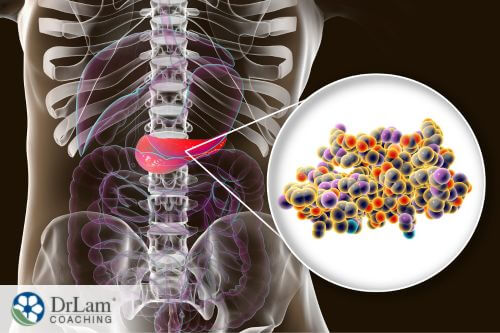 Menopause comes with a lot of changes that can cause a host of symptoms and can contribute to concerning health conditions. One of these conditions is diabetes. While menopause does not cause diabetes, many going through menopause are at increased risk for this condition. Symptoms of menopause and diabetes risk are linked, if indirectly. This article will investigate how menopause is connected to diabetes and dietary measures to lower your diabetes risk and manage menopause symptoms.
Menopause comes with a lot of changes that can cause a host of symptoms and can contribute to concerning health conditions. One of these conditions is diabetes. While menopause does not cause diabetes, many going through menopause are at increased risk for this condition. Symptoms of menopause and diabetes risk are linked, if indirectly. This article will investigate how menopause is connected to diabetes and dietary measures to lower your diabetes risk and manage menopause symptoms.
Menopause is defined as 12 months without the body releasing an egg and or experiencing a period. However, this process is gradual. Before menopause, the ovaries, produce an egg usually every month. This egg is either fertilized and results in a pregnancy, or it remains unfertilized and is shed from the body monthly in a process known as menstruation, your cycle, or your period. In premenopause, the reproductive system that was active and releasing eggs monthly starts to slow down, releasing fewer and fewer eggs, and eventually stops.
The age at which you will reach menopause depends on many factors. However, the average age is 40 to 58 years, with 52 years being the average age in America. For some women, it will occur earlier due to premature menopause, medical conditions, or the surgical removal of the uterus and ovaries.
There are several hormones that are involved in this process with one of the main ones being estrogen. Whilst you may think that there is only one type of estrogen, there are three different types. In your reproductive years, the main type of estrogen is estradiol. As your body prepares for menopause the production of estradiol starts to reduce. After menopause, the main type of estrogen the body produces is estrone.
There are three different stages of menopause, these are:
As perimenopause begins, the shift in hormones can cause several symptoms that include:
Weight gain is one symptom many women experience, this weight is typically gained around the stomach area. This addition of weight not only affects your confidence and self-esteem but can also affect your health.
One of the ways weight can affect your health is by increasing the risk of diabetes. Diabetes is a medical condition that affects the glucose levels in your body. Type 2 diabetes and prediabetes, a phase when you are transitioning to diabetes, are the main types connected to menopause.
Menopause symptoms such as weight gain, don't cause diabetes. However, they do increase the risk of developing diabetes. This happens in a variety of different ways.
 When estrogen levels start to decline, studies have noted that many individuals experience an increase in resistance to the hormone insulin.
When estrogen levels start to decline, studies have noted that many individuals experience an increase in resistance to the hormone insulin.
When you consume food, the food, specifically carbohydrates, is broken down into glucose, your body's main form of fuel. In response to this glucose, your body produces insulin.
Insulin stimulates your cells to take in glucose. This keeps your blood glucose levels within the normal range.
The changes in estrogen can cause your body to become less responsive to insulin. This makes it harder for your body to maintain your glucose levels within the normal ranges.
With insulin resistance, your body may start to produce more insulin to maintain the glucose levels. When this doesn't work, your glucose levels will begin to rise above the normal range. This results in diabetes.
The weight gain that occurs before and during menopause can also exacerbate this insulin resistance, further increasing the risk of developing diabetes. In addition, poor sleep, fatigue, and changes to metabolism are all contributing symptoms of menopause and diabetes risk factors. They can lead to weight gain and insulin resistance.
Nutrition is an important part of managing menopause symptoms, especially with weight gain and insulin resistance. What you eat can affect both symptoms of menopause and diabetes risk.
These are one of the three macronutrients and are the main sources of fuel in your body. Carbohydrates include not only bread, pasta, and rice but also fruits and vegetables. Not only do they provide fuel to your body in the form of glucose but they also provide important vitamins and minerals that the other macronutrients - fat and protein - do not provide.
There are two types of carbohydrates: simple and complex carbohydrates.
Simple carbohydrates include sodas and candy. Simple carbohydrates are broken down quickly into the blood, resulting in your blood glucose level spiking and a subsequent release of insulin.
Complex carbohydrates, on the other hand, include whole grains and vegetables. Complex carbohydrates are broken down slowly into the blood, which results in a slow release of glucose, lower blood sugar levels, and a more controlled release of insulin.
Fruits are simple carbohydrates. However, they contain relatively low levels of sugar compared to processed foods and fiber to help slow the glucose release down.
A diet rich in simple carbohydrates will result in fluctuating glucose and insulin levels. This can exacerbate the weight gain and insulin resistance caused by menopause and diabetes.
In contrast, unrefined or complex carbohydrates help to control your sugar levels and the release of insulin. This can help to control hunger, balance energy levels, and assist with weight loss.
This method involves replacing refined, simple carbohydrates with unrefined, complex carbohydrates. Examples of this include replacing white bread with whole grain bread, white rice with brown rice, or white pasta with durum wheat pasta as well as increasing your intake of fruits and vegetables.
Foods high in sugar are simple carbohydrates and contribute to spiking glucose levels, symptoms of menopause and diabetes risk. These foods also include added sugars such as pastries, sodas, and candy. By reducing these foods and replacing them with foods that do not contain sugar, it can help to manage your glucose levels as well as lower the total calories that you consume. Some examples of replacements include water instead of soda and fruits instead of sugary treats.
 Another important aspect of nutrition that can affect menopause and diabetes is portion control. Generally, carbohydrates should make up 45-65% of your total calories consumed. However, many individuals have more carbohydrates in their diet than this.
Another important aspect of nutrition that can affect menopause and diabetes is portion control. Generally, carbohydrates should make up 45-65% of your total calories consumed. However, many individuals have more carbohydrates in their diet than this.
Typically during meals, your plate should be half fruits and vegetables, a quarter protein, and a quarter starch. However, many individuals skip fruits and vegetables and focus on far too many carbohydrates.
It's also a good idea to read the nutrition labels and try to stick to the recommended serving size for different foods. As you age, you need fewer calories, so eating portions that you needed a few decades ago can cause weight gain.
Foods high in caffeine, alcohol, and spicy foods can affect hot flashes by affecting the blood flow. These foods can dilate the blood vessels resulting in more blood being carried to the various parts of the body. This increase in blood can cause or exacerbate hot flashes. Reducing these foods in your diet can help to manage these menopause symptoms.
Insulin resistance has also been found to increase the prevalence of hot flashes and by improving insulin resistance, you will indirectly be relieving the hot flashes and night sweats.
The ketogenic diet is an increasingly popular diet that is low in carbohydrates, moderate in protein, and high in fats. Instead of carbohydrates contributing to 45-65% of energy, carbohydrates only contribute 5-10% of total energy, whilst protein contributes 30-35%, and fat contributes 55-60%. A ketogenic diet is a more intense method compared to the previous methods. However, research has shown that it has successfully helped assist in weight loss, symptoms of menopause and diabetes risk factors.
With this shift in macronutrients, fats begin to produce energy for the body rather than carbohydrates. Fatty acids in fats and protein are used by the liver to produce ketone bodies. These are water-soluble molecules that your body then uses for energy. Since fats and proteins get broken down into ketone bodies, there is no effect on glucose levels and subsequent insulin release. This can then assist with maintaining the glucose levels in the body and preventing any spikes.
The production of ketone bodies also helps to suppress your appetite, resulting in fewer calories being consumed and weight loss. This could also help to assist with the increase in hunger and cravings that sometimes accompany menopause.
These beneficial effects of the ketogenic diet can help to reduce the risk of insulin resistance and diabetes developing in the menopausal stage. It can help to improve sugar levels, improve insulin sensitivity, and may reduce the need for glucose-lowering medication.
Another useful benefit of the ketogenic diet is that it can also help to improve menopause symptoms such as hot flashes and night sweats by improving insulin sensitivity. Thus, a keto diet could be useful for managing symptoms of menopause and diabetes.
 Whilst this diet has multiple benefits, there are also drawbacks. The ketogenic diet is very strict and the ratios of the proteins, fats, and carbohydrates consumed need to be strictly within the ratios given for a ketogenic diet to work. If they are out of the range, this can prevent the body from producing ketone bodies and can then affect the results you will see with this diet. This diet is also hard to follow, with many studies reporting that adherence to this diet is low.
Whilst this diet has multiple benefits, there are also drawbacks. The ketogenic diet is very strict and the ratios of the proteins, fats, and carbohydrates consumed need to be strictly within the ratios given for a ketogenic diet to work. If they are out of the range, this can prevent the body from producing ketone bodies and can then affect the results you will see with this diet. This diet is also hard to follow, with many studies reporting that adherence to this diet is low.
The quality of proteins and fats consumed during a ketogenic diet is also important. Proteins and fats high in saturated fat can increase the levels of LDL cholesterol in the body and increase the risk of heart disease. Instead, it is important to focus on proteins and fats low in saturated fat and high in unsaturated fat. This will encourage the increase of beneficial cholesterol, HDL cholesterol, in the body, as well as helping to promote brain health and a reduction in inflammation.
Some supplements can also help affect menopause symptoms and diabetes risk factors. However, the best way to control weight, insulin, and diabetes risk is through diet.
Note that the FDA does not regulate supplements. This can result in supplements that contain poor-quality ingredients and not always doing what the supplement states. This makes it important to choose supplements from reputable companies. Whilst supplements can help to provide relief, it's also always important to get guidance from your healthcare provider before you try a new supplement.
These two supplements could help to relieve symptoms of menopause.
Estriol (E3) is one of the three types of estrogen and is the estrogen that is predominant during pregnancy. Apart from pregnancy, estriol concentrations are low in the body. This estrogen, however, has been found to reduce menopausal symptoms such as hot flashes, insomnia, and vaginal dryness.
This cream provides a measured dose of estriol as well as herbs such as evening primrose oil (EPO) and black cohosh that help to relieve menopause symptoms. This cream can be applied to the stomach area, hands, and thighs and should be rotated between these parts of the body.
Evening primrose is a flower that is native to North America. It has been used for many different ailments and research also suggests that evening primrose oil (EPO) can be effective for menopause symptoms.
EPO contains a high amount of omega-6 fatty acids, specifically gamma-linolenic acid (GLA). Your body cannot produce this fatty acid. GLA produces hormone-like substances, prostaglandins. These prostaglandins help to regulate blood flow. This helps to provide relief from menopause symptoms such as hot flashes.
This supplement provides EPO through a soft gel capsule that can be taken orally, once to twice a day. The dose should be determined by your healthcare provider.
Adrenal Fatigue Syndrome (AFS) is a condition brought on by chronic stress. Your body handles stress through your adrenal glands, two glands that sit atop your kidneys, and your NeuroEndoMetabolic (NEM) Stress Response System.
In short-term stress, your adrenal glands release stress hormones such as cortisol. This helps your body to deal with the stressor. In cases where stress is long-term, however, it can cause your adrenal glands to become depleted and cortisol production reduces.
 This causes imbalances within the NEM system to occur. The symptoms that you will experience during AFS will depend on where in the NEM system the imbalance is occurring. There are six different circuits of related organ systems in the NEM. One of these circuits is the hormone circuit. The adrenal glands, thyroid glands, and reproductive organs make up the hormone circuit. The circuit is responsible for the release and signaling of hormones within your body.
This causes imbalances within the NEM system to occur. The symptoms that you will experience during AFS will depend on where in the NEM system the imbalance is occurring. There are six different circuits of related organ systems in the NEM. One of these circuits is the hormone circuit. The adrenal glands, thyroid glands, and reproductive organs make up the hormone circuit. The circuit is responsible for the release and signaling of hormones within your body.
An imbalance in this circuit causes imbalances in your hormones. This causes symptoms such as fatigue, weight gain, pre-menstrual syndrome (PMS), irregular periods, sensitivity to temperatures, and estrogen dominance. These symptoms can mimic menopause symptoms. An imbalance in this circuit can also heighten symptoms of menopause and diabetes risk may also increase in some cases.
AFS can make your body incredibly sensitive and increases the risk of reacting negatively to any new products, food ingredients, or routines. A ketogenic diet can help to relieve menopause symptoms. However, the change from a moderate carbohydrate diet to a very low carbohydrate diet can act as a stressor and worsen fatigue at a time when your body needs energy. This can result in your body reacting to the changes and can set you back in your healing journey.
Some other drawbacks to a ketogenic diet are the short-term effects of feeling weak, dizzy, and lightheaded also known as keto-flu. Whilst these symptoms may sound relatively mild, if you are currently experiencing AFS, these symptoms can be severe and more pronounced. This diet can also cause vitamin and mineral deficiencies from the lack of carbohydrates. These deficiencies may cause more stress to your body and exacerbate AFS symptoms.
If you are considering the ketogenic diet for managing symptoms of menopause and diabetes, it is important to get guidance from your healthcare professional first. They will be able to guide you to a nutritional plan that will support your body best.
Menopause is a stage of life that may seem daunting and full of unpredictable symptoms that may worsen your diabetes risk. However, menopause symptoms can be managed through nutritional strategies. You might try more gentle strategies such as choosing unrefined carbohydrates and reducing total sugar or more intense strategies such as the ketogenic diet. These nutritional strategies each carry their advantages and drawbacks. Therefore, it is important to seek guidance from your healthcare professional on the best strategy for you.
If you are currently experiencing symptoms of menopause and are worried about ways to reduce your diabetes risk, try Dr. Lam's Adrenal Fatigue Recovery Program. You'll learn about your stage of adrenal fatigue, how to use the supplements, which foods to eat, the exercises that benefit you, and much more. This course is about helping you make informed choices and avoiding the pitfalls Dr. Lam faced in his recovery journey.

Experience Menopause and Diabetes Harmony with E3 Balance Cream!
Ali, E. et al. "Estriol: Emerging Clinical Benefits." Menopause, vol. 24, no. 9, Sep. 2017, pp. 1081-5. https://pubmed.ncbi.nlm.nih.gov/28375935/
Cohen, C. et al. "A Ketogenic Diet Reduces Central Obesity and Serum Insulin in Women with Ovarian or Endometrial Cancer." The Journal of Nutrition, vol. 148, no. 8, Aug. 2018, pp. 1253-60. https://www.sciencedirect.com/science/article/pii/S002231662216390X
Duval, K. et al. "Effects of the Menopausal Transition on Dietary Intake and Appetite: a MONET Group Study." Eur J Clin Nutr. vol. 68, no. 2, Feb. 2014, pp. 271-6. https://pubmed.ncbi.nlm.nih.gov/24065065/
Farzaneh, F. et al. "The Effect of Oral Evening Primrose Oil on Menopausal Hot Flashes: A Randomized Clinical Trial." Arch Gynecol Obstet. vol. 288, no. 5, Nov. 2013, pp. 1075-9. https://pubmed.ncbi.nlm.nih.gov/23625331/
Gibson, A. et al. "Do Ketogenic Diets Really Suppress Appetite? A Systematic Review and Meta-Analsysi." Obes. Rev. vol. 16, no. 1, Jan. 2015, pp. 64-76. https://pubmed.ncbi.nlm.nih.gov/25402637/
Head, K. "Estriol: Safety and Efficacy." Altern Med Rev. vol. 3, no. 2, Apr.1998, pp. 101-13. https://pubmed.ncbi.nlm.nih.gov/9577246/
Iliodromiti, S. et al. "Menopausal Hot Flashing and Endothelial Function in Two Vascular Beds: Findings From a Cross-Sectional Study of Postmenopausal Women." Menopause, vol. 26, no. 9, Sep. 2019, pp. 1002-9. https://pubmed.ncbi.nlm.nih.gov/31453962/
Masood, W, et al. "Ketogenic Diet." StatPearls, Jan. 2022. https://www.ncbi.nlm.nih.gov/books/NBK430685/
While symptoms of menopause and diabetes can be connected, they are not directly linked. There is no reason why menopause has to lead to diabetes. However, many symptoms of menopause can increase your diabetes risk, including weight gain, poor sleep, fatigue, and hormone imbalances. As such, it is important to focus on eating a healthy diet to lower your risk.